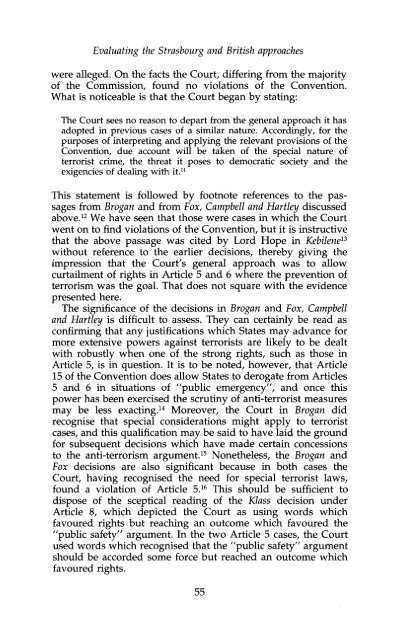Human Rights, Serious Crime and Criminal Procedure - College of ...
Human Rights, Serious Crime and Criminal Procedure - College of ...
Human Rights, Serious Crime and Criminal Procedure - College of ...
- No tags were found...
You also want an ePaper? Increase the reach of your titles
YUMPU automatically turns print PDFs into web optimized ePapers that Google loves.
Evaluating the Strasbourg <strong>and</strong> British approacheswere alleged. On the facts the Court, differing from the majority<strong>of</strong> the Commission, found no violations <strong>of</strong> the Convention.What is noticeable is that the Court began by stating:The Court sees no reason to depart from the general approach it hasadopted in previous cases <strong>of</strong> a similar nature. Accordingly, for thepurposes <strong>of</strong> interpreting <strong>and</strong> applying the relevant provisions <strong>of</strong> theConvention, due account will be taken <strong>of</strong> the special nature <strong>of</strong>terrorist crime, the threat it poses to democratic society <strong>and</strong> theexigencies <strong>of</strong> dealing with it. 11This statement is followed by footnote references to the passagesfrom Brogan <strong>and</strong> from Fox, Campbell <strong>and</strong> Hartley discussedabove. 12 We have seen that those were cases in which the Courtwent on to find violations <strong>of</strong> the Convention, but it is instructivethat the above passage was cited by Lord Hope in Kebilene 13without reference to the earlier decisions, thereby giving theimpression that the Court's general approach was to allowcurtailment <strong>of</strong> rights in Article 5 <strong>and</strong> 6 where the prevention <strong>of</strong>terrorism was the goal. That does not square with the evidencepresented here.The significance <strong>of</strong> the decisions in Brogan <strong>and</strong> Fox, Campbell<strong>and</strong> Hartley is difficult to assess. They can certainly be read asconfirming that any justifications which States may advance formore extensive powers against terrorists are likely to be dealtwith robustly when one <strong>of</strong> the strong rights, such as those inArticle 5, is in question. It is to be noted, however, that Article15 <strong>of</strong> the Convention does allow States to derogate from Articles5 <strong>and</strong> 6 in situations <strong>of</strong> "public emergency", <strong>and</strong> once thispower has been exercised the scrutiny <strong>of</strong> anti-terrorist measuresmay be less exacting. 14 Moreover, the Court in Brogan didrecognise that special considerations might apply to terroristcases, <strong>and</strong> this qualification may be said to have laid the groundfor subsequent decisions which have made certain concessionsto the anti-terrorism argument. 15 Nonetheless, the Brogan <strong>and</strong>Fox decisions are also significant because in both cases theCourt, having recognised the need for special terrorist laws,found a violation <strong>of</strong> Article 5. 16 This should be sufficient todispose <strong>of</strong> the sceptical reading <strong>of</strong> the Klass decision underArticle 8, which depicted the Court as using words whichfavoured rights but reaching an outcome which favoured the"public safety" argument. In the two Article 5 cases, the Courtused words which recognised that the "public safety" argumentshould be accorded some force but reached an outcome whichfavoured rights.55
















